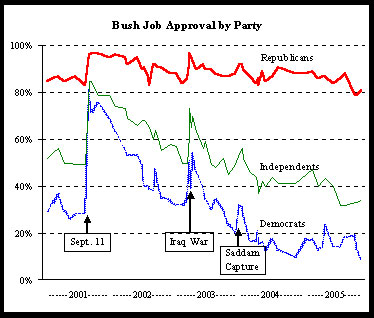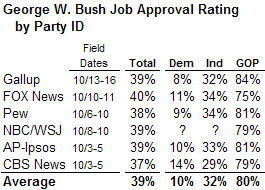Following up on yesterday’s post, reader ZH asked some reasonable questions about presidential approval ratings:
How low does a president’s approval rating get, realistically speaking? What is the lowest recorded rating ever? How about in recent memory?
Back in March, the Gallup Organization’s Jeffrey Jones did some analysis showing that presidential approval has sometimes fallen below 30% on their surveys:
Four presidents hit bottom below the 30% approval level — Harry Truman (23%), Richard Nixon (24%), Jimmy Carter (28%), and the elder George Bush (29%). Four others bottomed out below 40% — Lyndon Johnson (35%), Gerald Ford (37%), Ronald Reagan (35%), and Bill Clinton (37%). Kennedy’s low point was 56%; Eisenhower’s, 49%.
Most presidents’ low approval ratings can be attributed to events that were demonstrably not going well for the United States — specifically, the Korean War for Truman, the Vietnam War and racial tensions for Johnson, imminent impeachment for Nixon over the Watergate scandal, the energy crisis for Carter, and flagging economies for Ford, Reagan, and Bush the elder.
Also of note is that Johnson’s and the elder Bush’s low points came in polls completed just after the opposition parties held their presidential nominating conventions, which likely served to focus the nation’s attention on its problems and to lay the blame for those squarely on the president’s shoulders.
The Gallup analysis, which also includes complete results for the “low” for each president along with field dates, is available to paid subscribers only.
Approval ratings for governors and other offices has been known to fall even lower. For example, the most recent job ratings for Ohio Governor Robert Taft were 15% and 17% respectively on polls by the Columbus Dispatch and SurveyUSA. Taft’s free fall to that level occurred in part because his approval among Republicans collapsed to only 25%.
So another way to think about how low the President’s numbers could go is to consider Bush’s support among Republicans. The overwhelming majority of those that now approve of his performance are either identify as Republicans or tell pollsters they are independents who “lean” Republican (see the IPSOS crosstabs). For Bush’s numbers to fall much further, he will need to lose significant support from Republicans.
So far, at least, any such erosion has been minimal. The most recent survey report from the Pew Research Center included the following chart showing the trend in presidential approval over the year.

The Pew report concluded:
The president continues to draw strong support from Republicans, 81% of whom approve of the job he is doing. But that number reflects an eight-point decline since January, with most of that drop occurring in late summer. Among independents, a plurality of 47% approved of Bush’s performance in January; now just 34% do so. Approval among Democrats is now in the single digits (9%), down from 17% in January.
MP also cobbled together results by party where available from the six pollsters that released surveys in the last week. Remember, we are looking at relatively small sample sizes (hundreds of interviews, not thousands) with more random varation, but the overall pattern is consistent with the results reported by Pew (source links: USAToday/Gallup, Fox, Pew, WSJ/NBC, AP-IPSOS & CBS). Bush shows an average 80% support from Republicans across the six surveys.

MP could find only two of these organizations, other than Pew, that characterized the trend in the job approval rating by party over the last month. Both indicate that for now at least, Bush’s support from Republicans is holding at roughly 80%:
CBS: Those in [Bush’s] own party are still overwhelmingly positive about his performance (nearly 80 percent approve), but the president receives little support from either Democrats or Independents. And while views of President Bush have lately not changed much among Republicans or Democrats, his approval rating among Independents has dropped 11 points since just last month, from 40 percent to 29 percent now.
USAToday (Gallup): Bush’s fall, from a 45% approval rating in late September, is largely due to a drop in support among independents and Democrats. His approval among independents declined to 32% from 37% since the last USA TODAY/CNN/Gallup Poll taken Sept. 26-28. Approval among Democrats fell to 8% from 15%.
Bush’s approval among his Republican base continues to hold firm. It was 85% in the previous poll and 84% in the latest, steady support that’s preventing him from falling lower.
Hmmmm. So among all presidents holding office in the last 40+ years, Johnson through Bush 2, GWB’s lowest low in approval ratings is the highest. So far, anyway. That knowledge certainly changes the way I think of Bush’s current numbers. Why is it, I wonder, that no one else ever seems to point that out?
Re Bush’s seemingly stable, high support from Republicans: Isn’t it possible that the reason for this is that some people who would have self-identified as Republicans if polled earlier are now so negative about Bush that they are now calling themselves independents? I noticed that at the end of the party trendlines in your graph, there is a slight up-tick in Republican support at the same time that independents are going more negative on Bush.
How Low Can It Go?
With President Bush’s approval numbers falling to new lows in all recent polls, Mystery Pollster notes we need to consider Bush’s support among Republicans to see if they can go much lower. “The overwhelming majority of those that now approve of his pe…
Isn’t it possible that the reason for this is that some people who would have self-identified as Republicans if polled earlier are now so negative about Bush that they are now calling themselves independents?
Presumably you could suss this out by comparing the sample makeup from poll to poll, no? If fewer people are self-ID’ing as GOP, then that ought to show up in unweighted samples.
Why not do a poll of University poilitical science professors as concerned with the Patriot Act? Why not ask about reform to remove the electoral college from the election process so that President Putan can’t continue to comment that the Iraqui elections, the Afganistan elections, and even the Russian elections are more free than ours, because in all these other countries there is a direct vote of the people to elect rulers, and that if a direct vote of the people had beenthe deciding factor in our elections, there would have been a President Gore. Why not be what we say we are, instead of “do as I say, not as I do.”
Billie-
There is nothing preventing States from allocating their Electoral votes proportionally-Maine does this, and Coloradans rejected an initiative in 2004 to split their votes.
I believe that the leaders of most parliamentary governments are selected by the equivalent of Congress, not by the voters. Are these elections less “free” because the voter does not vote for a candidate?
We’ve been doing exactly what we’ve said we would longer than anyone else-since the Constitution was written over 200 years ago.
Marty
Maggie: I have no idea what you are talking about. Keep drinking and smoking whatever it is that makes you think that Bush’s numbers are great. Wow, to be obliviuos like you…..
Marty H, Maine does not allocate its electors proportionally. If it did, it would have divided its electors in every election, instead of in none of them.
What Maine does (and Nebraska, too) is allocate them by the winner of each congressional district, and two to the statewide winner.
So, the Maine electors can split 3-1, but never 2-2, as they would have in any close election if it were proportional.
Finally, if they were proportional, they probably would have gone 2-1-1 in 1992, but instead Clinton got all 4 of them.
I just wanted to say that… so i say – that.